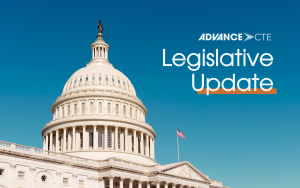Federal Government Reopens
After 43 days, Congress has ended the longest federal government shutdown in U.S. history. On Monday, the Senate approved a funding package, followed by the passage in the House on Wednesday. The President signed the bill into law shortly after to restore operations across federal agencies. The agreement combines a short-term continuing resolution (CR) with three fiscal year 2026 (FY26) funding measures for several portions of the federal government. The legislation also reverses reductions-in-force (RIFs) at federal agencies initiated during the shutdown. The CR will fund all other federal agencies, including programs overseen by the U.S. Departments of Education (ED) and Labor (DOL), through January 30, 2026, giving Congress another deadline in the wider FY26 appropriations process.
Notably for the Career Technical Education (CTE) community, the CR signed into law continues level funding for the Carl D. Perkins Career and Technical Education Act (Perkins V) state grant program through this new date. As a reminder, funding for CTE and other education and workforce programs is supported through the Labor, Health and Human Services, Education, and Related Agencies appropriations (Labor-HHS-ED) bill, one of the nine remaining FY26 appropriations bills to be considered.
Advance CTE will continue to monitor the impacts of the federal government shutdown on the CTE, education, and workforce communities, and will continue to track the progress of the appropriations process as it relates to CTE and Perkins V and advocate for strengthened federal investments critical to CTE.
ED Opens Postsecondary Grant Opportunities
This week, the Department of Education (ED) announced a new grant competition through the Fund for the Improvement of Postsecondary Education–Special Projects (FIPSE-SP), offering institutions of higher education (IHEs) and postsecondary partners support across four priority areas: advancing artificial intelligence (AI) in postsecondary education, promoting civil discourse, reforming accreditation, and expanding short-term workforce programs. Projects will be supported that leverage AI to improve postsecondary student outcomes and broaden foundational exposure to AI and computer science across institutions; encourage practices and programs that foster respectful debate, viewpoint diversity, and civil dialogue within colleges and universities; aid institutions seeking to change accrediting agencies and support the creation of new accrediting bodies aimed at increasing choice and competition in accreditation.
In addition, the announcement includes a new priority of interest to CTE leaders related to the development and expansion of high-quality, shorter-term CTE and job training programs that lead to credentials that can qualify for the newly enacted Workforce Pell grant program – an initiative that was passed as part of the One Big Beautiful Bill Act (OBBBA) this summer. With WFP launching July 1, 2026, ED’s focus signals a clear push to grow career-focused pathways. Applications are open now and due December 3, 2025.
ED Concludes Student Loan Negotiated Rulemaking
Last week, ED announced that its Reimagining and Improving Student Education (RISE) Committee has reached consensus on regulatory provisions to implement major student loan changes included in the OBBBA. The agreement covers new repayment structures, loan limits, definitions of professional programs, deferment and forbearance rules, and updates to Income-Driven Repayment. Notably, the committee endorsed higher loan limits for specific professional programs and affirmed that future loan amounts will be prorated for part-time students for the first time. ED is expected to publish proposed regulations reflecting the committee’s work, with implementation targeted for July 1, 2026. A separate negotiated rulemaking panel focused on Workforce Pell and institutional accountability will convene in December. Read the announcement here.
Senate Committee Holds Hearing on Registered Apprenticeship
Last week, the Senate Health, Education, Labor, and Pensions (HELP) Committee held a hearing titled “Registered Apprenticeship: Scaling the Workforce for the Future.” The hearing highlighted visions for registered apprenticeship programs (RAPs), with some witnesses sharing that the complexity of the existing system inhibits growth and scaling of RAPs. In contrast, others shared concerns that lower standards would lower program quality. The hearing stressed the burdensome registration process and inconsistent state requirements that can make it difficult for employers – especially smaller ones – to partner with education systems and scale high-quality pathways. It also emphasized the need for predictable, formula-based funding that supports stronger links between RAPs, secondary CTE, community colleges, workforce development programs through the Workforce Innovation and Opportunity Act (WIOA), and emerging opportunities like Workforce Pell. The hearing reaffirmed the bipartisan interest in strengthening apprenticeships and their connection to CTE. Watch the recording here.
Odds and Ends
- Last week, the Senate HELP Committee held a hearing titled “Reforming Financial Transparency in Higher Education” to examine how colleges report costs and learner outcomes. Witnesses urged clearer, more consistent information to help learners and families make informed decisions. Watch the hearing here.
- At the end of October, Senate HELP Committee Chair Bill Cassidy (R-LA) introduced the Learning Innovation and Family Empowerment (LIFE) with AI Act. The bill expands federal student privacy protection to cover AI tools and give parents greater oversight of AI use in K-12 classrooms. Read the full text here.


